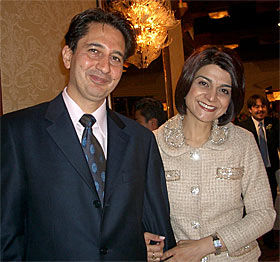UC Berkeley Web Feature
Afghan ambassador to the U.S. to speak at UC Berkeley on April 17, student penny campaign begins
BERKELEY – Afghanistan's ambassador to the United States, Said T. Jawad, will speak at the University of California, Berkeley, on Tuesday, April 17, about efforts to secure peace in his war-torn country. At a reception following his talk, Jawad and his wife, Shamim, will be presented with money collected by UC Berkeley students through a Roots of Peace penny campaign.
 Said and Shamim Jawad |
Ambassador Jawad's 1-3 p.m. talk, "Winning the Peace in Afghanistan, Challenges and Opportunities," is being sponsored by UC Berkeley's International and Area Studies (IAS) and Peace and Conflict Studies programs. It will be held in 315 Wheeler Hall and is free and open to the public.
"Ambassador Jawad has held a number of key leadership roles in Afghanistan's nation-building process. At this critical juncture in Afghanistan's quest for a stable peace and democratic future, we are pleased that he has agreed to share his views with the university community on the difficult challenges ahead," said Jerry Sanders, chair of Peace and Conflict Studies.
Shortly after the 1980 Soviet invasion of Afghanistan, Said Jawad left his country and went into exile in Germany, where he studied law. In 1986, he moved to the United States, where he later received his MBA from Golden Gate University in San Francisco. He returned to Afghanistan four months after the Sept. 11, 2001, attacks to assist in rebuilding his country. Prior to becoming ambassador, he was Afghan President Harmid Karzai's press secretary, chief of staff and director of the Office of International Relations.
Jawad has helped formulate strategies, implement policies, build national institutions and prioritize reforms in Afghanistan, and he served as Karzai's principal liaison with the constitutional commission throughout the drafting of Afghanistan's constitution.
In Afghanistan, one of the world's poorest countries, over 60 people a month are killed or maimed by landmines or unexploded ordnance, according to Roots of Peace, a San Rafael-based group whose mission is to transform the world's toxic minefields into thriving farmlands and communities. More than 10,000 Afghan farmers have been trained to grow grapes and raisins, the group says, and 100,000 landmines and unexploded military artillery have been removed from the once-fertile Shomali Plains.
Through the Roots of Peace's Penny Campaign, thousands of American students and community members have collected more than 10 million "pennies for peace" to protect lives in war-torn countries. According to Roots of Peace, these pennies have helped clear a dangerous minefield next to the Bajgah village school in northern Afghanistan, restore soccer fields on former mine fields at schools in Bagram, and build new classrooms at a former tent school in Mir Bacha Kot.
Shamim Jawad is the international chairperson of the penny campaign. She is also founder of Ayenda, the Afghan Children Initiative, a non-profit organization that implements projects advancing the welfare, education, health, shelter, safety, and the artistic and athletic abilities of Afghan children.
"We are witnessing a bright and peaceful beginning for Afghan children who have been the prime victims of war, terror and brutality," she has said of the penny campaign. "For the past three decades, violence has deprived our children of a proper education, and landmines have taken their lives and limbs away. Now is the time to give them the hope, education and resources that every child deserves and demands."
The Jawads' visit is being co-sponsored by the Rotary Center for International Studies in Peace and Conflict Resolution at IAS. Rotary World Peace Scholars are selected by Rotary International, a worldwide organization of Rotary service clubs, and UC Berkeley has as two-year master's degree program for these scholars that emphasizes human rights, peace and conflict resolution, and international studies.
For more information about the April 17 event, please visit www.ias.berkeley.edu. For more about the Roots for Peace penny campaign, please contact Paulo Amaral at amaral@berkeley.edu or (562) 307-4709. For additional information about Roots of Peace, visit http://www.rootsofpeace.org.

